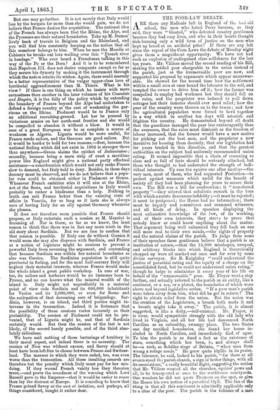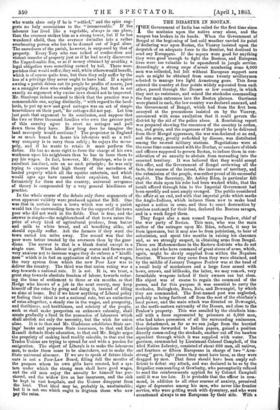THE POOR-LAW DEBATE. A RE there any Radicals left in England
of the. bad old school, the men who hated Peers because, as they said, they were "bloated," who detested country gentlemen because they had easy lives, and who in their hearts thought rick-burning only a wild form of justice on the men who kept up bread at an artificial price? If there are any left since the repeal of the Corn Laws the debate of Monday night gives them a magnificent opportunity. We have not had such an explosion of undisguised class selfishness for the last ten years. Mr. Villiers moved the second reading of his Bill, Making the settled poor chargeable to the union instead of the parish, just as the irremoveable poor are now, and supported his proposal by arguments which appear unanswer- able. He showed for the second time how the settlement within a small area at once bound the labourer to the soil, and tempted the owner to drive him off it; how the farmer was compelled to employ bad workmen lest they should fall 011 the rates, and the proprietor was induced to pull down cottages lest their inmates should ever need relief; how the poor of the country were thrown on to the towns ; and how the agricultural population were forced to herd together in a way which in another ten days will astonish and frighten the country. He demonstrated beyond all doubt that the guardians managed the poor less extravagantly than the overseers, that the rates must diminish as the freedom of labour increased, that the farmer would have a new motive for picking out the best men, and the proprietor a new incentive for housing them decently, that our legislation had for years tended in this direction, and that the greatest authorities on the subject had uniformly recommended union rating. It seemed impossible that a chain of reasoning so close and so full of facts should be seriously attacked, but those who thought so had underrated the strength of indi- vidual interests. Up rose the squires one after another—the very men, most of them, who had supported Protection—to protest against measures which undid for the benefit of society all they had been planning for years to secure their own. The Bill was a bill for confiscation; it "transferred property "—they uttered that cabalistic remark in the tone with which a curate denounces infidelity ;—it must be rejected ; it must be postponed; the House had no information ; there must be inquiry and committees and crammed witnesses, and all kinds of delay. In speeches displaying the most exhaustive knowledge of the law, of its working, and of their own interests, they store to prove that nobody knew or could know anything about the matter. That argument being well exhausted they fell back on one still more real to their own minds,—the rights of property and the natural claims of the parish. To judge from some of their speeches these gentlemen believe that a parish is an institution of nature,—that the 15,000 misshapen, unequal, and arbitrary blocks into which England is theoretically chopped up were all marked out once and for ever by some divine surveyor. Sir R. Knightly "could understand the justice of parochial rating and the equity of a charge on the consolidated fund, but he could not understand union rating," though he helps to administer it every year of his life on behalf of the " irremoveable " poor. Mr. Floyer went a step further, and actually referred to the parish as an entity, like a continent, or a sea, or a planet, the boundaries of which were above and beyond legislative action. "If a poor man's parish were taken away from him, what did he get in return ? The right to obtain relief from the union. But the union was the creation of the Legislature, a breath hath made it and a breath might take it away." The parish, it is almost suggested, is like a deity,—self-existent. Mr. Floyer, it is clear, would sympathize strongly with the old lady who lived in Virginia, and all her life had denounced North Carolina as an unhealthy, swampy place. The two States one day rectified boundaries, she found her house in- cluded in North Carolina, and immediately died of ague. To him the parish is as fixed a fact as the existence of stars, something which has been, is, and always shall be—a rock, as Schiller sings of Britain, "when man from wrong a refuge needs." He grew quite idyllic in its praise. The labourer, he said, looked to his parish, "for there at all events stood the parish church, a sign of better things, with all its associations," a really beautiful flight, suggesting the notion that Mr. Villiers wanted all the churches, squires' pews and all, to be transp)rted at once to the workhouse courtyards. One wonders he did not quote Thomson on the spot, or give the House his own notion of a parochial idyll. The fan of the thing is that all this sentiment is admittedly applicable only to a class of the poor. The parish is the reliance of a man who wants alms only if he is "settled," and the spire sug- gests no holy associations to the " irremoveable." If the labourer has lived like a vegetable, always in one place, then the overseer strikes him as a strong tower, but if he has wandered afield, then the overseer dwindles into a rather overbearing person who has to be dunned out of legal alms. The sacredness of the parish, however, is surpassed by that of property. Every Tory who rose talked of confiscation and violent transfer of property just as if he had newly discovered the Unpardonable Sin, or as if money obtained by avoiding a legal obligation were something earned by toil. There were parishes that would suffer, they said, while others would benefit, which is of course quite true, but then they only suffer by the loss of a privilege they never ought to have had. If a squire owning a parish drives out its people he profits of course, just as a smuggler does who evades paying duty, but that is not exactly an argument why excise laws should not be improved. Mr. Stanhope indeed seemed to think that the practice was a commendable one, saying distinctly, "with regard to the land- lords, to put up new and good cottages was an act of simple benevolence on their part," for cottages did not pay. Let him just push that argument to its conclusion, and suppose that the two or three thousand families who own the greater part of this country agree to erect no cottages and pull down those they have. How long does he imagine the land monopoly would continue ? The proprietor in England is as much bound to house his labourers well as a rail- way company is to carry them safely ; he enjoys the mono- poly, and if he wants to retain it must perform the duties. He has no more right to force the charge of his own workmen upon his neighbours than he has to force them to pay his wages. In fact, however, Mr. Stanhope, who is an excellent landlord, acts on no such principle ; he was only trying to express that high theory of the sacredness of landed property which all the squires entertain, and which would ages ago have caused their expulsion, but that, fortunately fur them and the country, universal arrogance of theory is compensated by a very general kindliness of practice.
In the whole course of the debate only three arguments of even apparent validity were produced against the Bill. One was that in certain cases a town which was only a parish would tax the surrounding farmers for the support of the town poor who did not work in the fields. That is true, and the answer is simple—the neighbourhood of that town raises the price of every kind of agricultural produce, from butter and milk to white bread, and all benefiting alike, all should equally suffer. Ask the farmers if they want the town carted ten miles away. The second was that the poor were better treated by the overseers than by the guar- dians. The answer to that is a blank denial except in a single case. When labour is getting scarce and farmers are very anxious not to increase wages they do enforce a " kindli- ness " which is in fact an application of rates in aid of wages, the very system from which the new Poor Law was to deliver the country. The third was that union rating was a step towards a national rate. It is not. It is, we trust, a great step towards absolute freedom of labour, towards reduc- ing the time of settlement to three or six months, so that Hodge who knows of a job in the next county, may keep himself off the rates by going and doing it, instead of idling on alms at home. But if we know anything of Liberal policy or feeling their ideal is not a national rate, but an extinction of rates altogether, a steady rise in the wages, and prosperity, and thriftiness, and healthiness, and sobriety of the people, such as shall make pauperism an unknown calamity, shall &este gradually 'a fund- in the possession of labourers which shall abolish not only the necessity, but the wish for union alms. It is to that end Mr. Gladstone establishes State sav- ings' banks and proposes State insurance, to that end Earl Russell defends State education, to that end Mr. Bright urges the propriety of making land readily saleable, to that end the Trades Unions are trying to spread far and wide a passion for emigration. The object of Liberals is to make the labourers men, to make them maw to be almstakers, not to make the State universal almoner. If we are to speak of future ideals oars is not a Poor-Law Board, filling full the mouths of the paupers whom its own gifts have created, but a sys- tem under which the strong man shall have good wages, and the old man enjoy the annuity he himself has pur- chased, and the widow live on her insurance, and the sick be kept in vast hospitals, and the Unions disappear from the land. That ideal may be, probably is, unattainable; but it is not one which ought to frighten those who now pay the rates.































 Previous page
Previous page